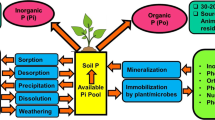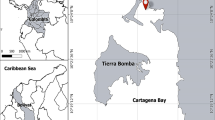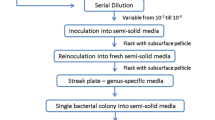Abstract
Zinc (Zn) is an important trace element that is essential for optimal plant growth. Zinc-solubilising bacteria can release Zn from its insoluble compounds. We isolated and identified Zn-solubilising bacteria (ZnSB) from the rhizosphere, and semi-quantitively and quantitatively evaluated their ability to dissolve various Zn minerals (ZnO, ZnCO3 and Zn3(PO4)2). Out of 24 rhizosphere soil samples, 15 strains of Zn-solubilising bacteria were isolated and purified. Five isolates that were found to be the most efficient in solubilising insoluble Zn compounds were identified based on gene 16S rRNA sequencing. Three of the isolates belonged to the genus of Pseudomonas, and two to Enterobacter. The highest solubilisation index among the three insoluble Zn compounds was observed in Pseudomonas putida (3.31) in the culture medium containing ZnO. Among the three tested insoluble compounds, the highest mean solubility by the strains was obtained from ZnO, followed by ZnCO3, and Zn3(PO4)2, respectively. The highest rate of Zn release among the three insoluble compounds was obtained in the culture medium of the Pseudomonas fluorescence strain Ur22 (35.6 mg L−1), which was ten times as great as that of the background solubilisation observed in the sterile control culture medium (3.8 mg L−1). Zn solubilisation was associated with a strong pH decrease in the culture medium, the strongest for Pseudomonas fluorescence (Ur21), which lowered pH to 4.2 compared to the control at pH 6.8. We concluded that the identification of effective ZnSB, and their use as bio-fertiliser, will help improve plant nutrition and production.




Similar content being viewed by others
References
Alloway BJ (2009) Soil factors associated with zinc deficiency in crops and humans. Environ Geochem Health 31:537–548. https://doi.org/10.1007/s10653-009-9255-4
Andreini C, Bertini I, Rosato A (2009) Metalloproteomes: a bioinformatic approach. Acc Chem Res 42:1471–1479. https://doi.org/10.1021/ar900015x
Bapiri A (2008) Evaluation of efficacy of different strains of fluorescent pseudomonas in increasing solubility of low soluble zinc sources. PhD Thesis, Department of Soil Science, Faculty of Agriculture, Islamic Azad University, Tehran Science and Research Branch, Tehran, Iran. (In Persian)
Bhattacharya L, Elzinga EJ (2018) A comparison of the solubility products of layered Me(II)–Al(III) hydroxides based on sorption studies with Ni(II), Zn(II), Co(II), Fe(II), and Mn(II). Soil Syst 2:20–35. https://doi.org/10.3390/soilsystems2020020
Burman U, Saini M, Kumar P (2013) Effect of zinc oxide nanoparticles on growth and antioxidant system of chickpea seedlings. Toxicol Environ Chem 95:605–612. https://doi.org/10.1080/02772248.2013.803796
Broadley MR, White PJ, Hammond JP, Zelko I, Lux A (2007) Zinc in plants. New Phytol 173:677–702. https://doi.org/10.1111/j.1469-8137.2007.01996.x
Cakmak I (2008) Enrichment of cereal grains with zinc:agronomic or genetic biofortification? Plant Soil 302:1–17. https://doi.org/10.1007/s11104-007-9466-3
Costerousse B, Schönholzer-Mauclaire L, Frossard E, Thonar C (2018) Identification of heterotrophic zinc mobilization processes among bacterial strains isolated from wheat rhizosphere (Triticum aestivum L.). Appl Environ Microbiol 84:e01715-e1717. https://doi.org/10.1128/AEM.01715-17
Dinesh R, Srinivasana V, Hamzaa Sarathambala SC, Anke Gowdaa SJ, Ganeshamurthyb AN, Guptac SB, Aparna Nairc V, Subilaa KP, Lijinaa AV, Divyaa C (2018) Isolation and characterization of potential Zn solubilizing bacteria from soil and its effects on soil Zn release rates, soil available Zn and plant Zn content. Geoderma 321:173–186. https://doi.org/10.1016/j.geoderma.2018.02.013
Eshaghi E, Nosrati R, Owlia P, Malboobi MA, Ghaseminejad P, Ganjali MR (2019) Zinc solubilization characteristics of efficient siderophore-producing soil bacteria. Iran J Microbiol 11(5):419–430. https://doi.org/10.18502/ijm.v11i5.1961
Fasim F, Ahmed N, Parsons R, Gadd GM (2002) Solubilization of zinc salts by a bacterium isolated from the air environment of a tannery. FEMS Microbiol Lett 213:1–6. https://doi.org/10.1111/j.1574-6968.2002.tb11277.x
Felsenstein J (1985) Confidence limits on phylogenies: An approach using the bootstrap. Evol 39:783–791. https://doi.org/10.2307/2408678
Gandhi A, Muralidharan G, Sudhakar E, 2Murugan A, (2014) Screening for elite zinc solubilizing bacterial isolate from rice rhizosphere environment. Int J Recent Sci Res 5:2201–2204. https://doi.org/10.1007/s13205-019-2033-9
Intorne AC, De Olierira MVV, Lima ML, Da Silva JF, De Souza Filho GA (2009) Identification and characterization of gluconacetobacter diazotrophicus mutants defective in the solubilization of phosphrous and zinc. Arch Microbiol 191:477–483. https://doi.org/10.1007/s00203-009-0472-0
Llop P, Caruso P, Cubero J, Morente C, López MM (1999) A simple extraction procedure for efficient routine detection of pathogenic bacteria in plant material by polymerase chain reaction. J Microbiol Methods 37:23–31. https://doi.org/10.1016/S0167-7012(99)00033-0
Malakouti MJ (2008) The effect of micronutrients in ensuring efficient use of macronutrients. Turk J Agric For 32:215–220
Montanha GS, Rodrigues ES, Romeua SLZ, de Almeida E, Reis AR, Lavres JJr, Pereira de Carvalhoa HW, (2020) Zinc uptake from ZnSO4 (aq) and Zn-EDTA (aq) and its root-to-shoot transport in soybean plants (Glycine max) probed by time-resolved in vivo X-ray spectroscopy. Plant Sci 292:110370. https://doi.org/10.1016/j.plantsci.2019.110370
Mumtaz MZ, Ahmad M, Jamil M, Hussain T (2017) Zinc solubilizing Bacillus spp. potential candidates for biofortification in maize. Microbiol Res 202:51–60. https://doi.org/10.1016/j.micres.2017.06.001
Myers SS, Wessells KR, Kloog I, Zanobetti A, Schwartz J (2015) Effect of increased concentrations of atmospheric carbon dioxide on the global threat of zinc deficiency: a modelling study. Lancet Glob Health 3:639–645. https://doi.org/10.1016/S2214-109X(15)00093-5
Rajasankar R, Vijayaragavan R (2017) Organic acids and exo-polysaccharide mediated zinc solubilization by soil bacteria and their plant growth promoting properties. Res J Pharm Biol Chem Sci 8:1545–1557
Saitou N, Nei M (1987) The neighbor-joining method: a new method for reconstructing phylogenetic trees. Mol Biol Evol 4:406–425. https://doi.org/10.1093/oxfordjournals.molbev.a040454
Saravanan VS, Subramoniam SR, Raj SA (2004) Assessing in vitro solubilization potential of different zinc solubilizing bacterial (ZSB) isolates. Braz J Microbiol 35:121–125. https://doi.org/10.1590/S1517-83822004000100020
Schaad NW, Jones JB, Chun W (2001) Laboratory guide for the identification of plant pathogenic bacteria (No. Ed. 3). American Phytopathological Society (APS Press). https://doi.org/10.1046/j.1365-3059.2001.00635.x
Senthil Kumar CM, Jacob TK, Devasahayam S, Stephy T, Geethu C (2018) Multifarious plant growth promotion by an entomopathogenic fungus Lecanicillium psalliotae. Microbiol Res 207:153–160. https://doi.org/10.1016/j.micres.2017.11.017
Shaikh SS, Saraf MS (2017) Optimization of growth conditions for zinc solubilizing plant growth associated bacteria and fungi. J Adv Res Biotech 2:1–9. https://doi.org/10.15226/2475-4714/2/1/00115
Sharma SK, Sharma MP, Ramesh A, Joshi OP (2012) Characterization of zinc-solubilizing Bacillus isolates and their potential to influence zinc assimilation in soybean seeds. J Microbiol Biotechnol 22:352–359. https://doi.org/10.4014/jmb.1106.05063
Singh B, Natesan SKA, Singh BK, Usha K (2005) Improving zinc efficiency of cereals under zinc deficiency. Curr Sci 88:36–44. https://www.jstor.org/stable/24110091
Suzuki T, Yamasato K (1994) Phylogeny of spore-forming lactic acid bacteria based on 16S rRNA gene sequences. FEMS Microbiol Lett 115:13–17. https://doi.org/10.1111/j.1574-6968.1994.tb06607.x
Tallapragada P, Seshachala U (2012) Phosphate-solubilizing microbes and their occurrence in the rhizospheres of Piper betel in Karnataka, India. Turk J Biol 36:25–35. https://doi.org/10.3906/biy-1012-160
Tamboli RR (2019) Isolation and characterization of zinc solubilizing bacteria from rhizosphere soil of Latur District, Marathwada, India. Biosci Biotechnol Res Asia 16:797–803. https://doi.org/10.13005/bbra/2796
Tamura K, Stecher G, Peterson D, Filipski A, Kumar S (2013) MEGA6: molecular evolutionary genetics analysis version 6.0. Mol Biol Evol 30(12):2725–2729. https://doi.org/10.1093/molbev/mst197
Ullah A, Farooq M, Nadeem F, Rehman A, Hussain M, Naveed NA, M, (2020) Zinc application in combination with zinc solubilizing Enterobacter sp. mn17 improved productivity, profitability, zinc efficiency, and quality of desi chickpea. J Soil Sci Plant Nutr 20:2133–2144. https://doi.org/10.1007/s42729-020-00281-3
Weisburg W, Barns SM, Pelletier DA, Lane DJ (1991) 16S ribosomal DNA amplification for phylogenetic study. J Bacteriol 173:697–703. https://doi.org/10.1128/jb.173.2.697-703.1991
Zaheer A, Malik A, Sher A, Mansoor Qaisrani M, Mehmood A, Ullah Khan S, Ashraf M, Mirza Z, Karim S, Rasoo M (2019) Isolation, characterization, and effect of phosphate-zinc-solubilizing bacterial strains on chickpea (Cicer arietinum L.) growth. Saudi J Biol Sci 26:1061–1067. https://doi.org/10.1016/j.sjbs.2019.04.004
Zhang X, Jiang B, Ma Y (2017) Aging of zinc added to soils with a wide range of different properties: factors and modeling. Environ Toxicol Chem 36:2925–2933. https://doi.org/10.1002/etc.3896
Acknowledgements
We gratefully thank Macrogen Corporation, South Korea, where the sequencing of the PCR product was performed. We also acknowledge the support of the Department of Soil Science, Urmia University.
Funding
This study is funded by the Department of Soil Science, Urmia University.
Author information
Authors and Affiliations
Contributions
Conceptualisation: Fatemeh Hashemnejad, Mohsen Barin, Maryam Khezri and Youbert Ghoosta. Data acquisition and data analysis: Fatemeh Hashemnejad and Mohsen Barin. Writing and editing: Fatemeh Hashemnejad, Mohsen Barin, Maryam Khezri and Edith Hammer.
Corresponding author
Ethics declarations
Competing Interests
The authors declare no competing interests.
Additional information
Publisher’s Note
Springer Nature remains neutral with regard to jurisdictional claims in published maps and institutional affiliations.
Rights and permissions
About this article
Cite this article
Hashemnejad, F., Barin, M., Khezri, M. et al. Isolation and Identification of Insoluble Zinc-Solubilising Bacteria and Evaluation of Their Ability to Solubilise Various Zinc Minerals. J Soil Sci Plant Nutr 21, 2501–2509 (2021). https://doi.org/10.1007/s42729-021-00540-x
Received:
Accepted:
Published:
Issue Date:
DOI: https://doi.org/10.1007/s42729-021-00540-x




